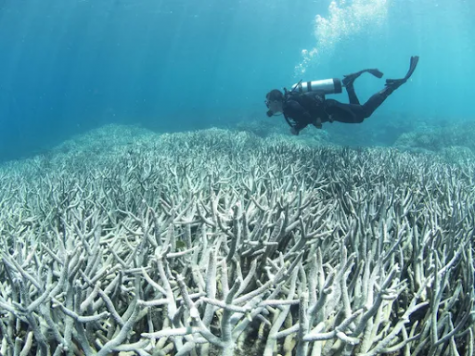The End of The World As We Know It: Barren Sea
This is an ongoing column called The End of the World As We Know It, where I will attempt to show you what our future will look like if we continue to destroy the environment at our current rate. These stories may seem like worst-case scenarios. They are not. Based on predictions from leading scientists and my own personal experiences, know that, without a significant change, this is our future. Thank you for reading.

February 5, 2019

A young man, enjoying his summer on some fair Caribbean isle, stands upon a white boat, the blue waves and drifting fishing nets crashing into the hull. He thinks back to that morning, when he was relaxing on the beach, the pristine white sand strewn with plastic bags and soda rings. He recalls the fish floating ominously just offshore, belly up. The boat slows to a stop, having finally reached its destination, the other passengers begin to put on flippers, masks, and snorkels, looking forward to their tour below. They rub in yet another layer of sunscreen; the burning rays of radiation that pour down from the heavens are far too dangerous without the protection. Finally, the boat tied off and sunblock applied, the tourists slip into the water. Submerged, they approach the coral reef. Once a bustling metropolis beneath the white-crested waves, now it endures as a ghost town. The skeletal, bleach-white corals are but a shadow of their former beauty. The young man dives down below the surface, searching for any movement in the graveyard below him. One small, singular fish darts away from the man, abandoning the futile attempt to scavenge any food from the barren reef. The man, disappointed, breaks off a small piece of coral as a souvenir, contributing even more to the destruction of the once beautiful underwater world.
This is no apocalyptic film, this is the end of the path we have been treading for years. Already one-fifth of the world’s coral reefs are lost or damaged to the point where they may not recover without major assistance from nonprofit organizations. Another 35% are likely to be destroyed within the next few decades. The Earth has the ability to restore itself, it’s true, but we need to stop destroying the reefs before they can heal. Greenhouse gasses cause acidification of the ocean and rising ocean temperatures, pollution and chemicals commonly found in sunscreen, such as Oxybenzone and Octinoxate, poison the waters, overfishing and unfriendly fishing techniques damage the ecosystem and the coral skeletons, invasive species like lionfish destroy populations of keystone species, and tourists who touch or take pieces of ocean life further contaminate and damage the delicate ecosystems. The reefs can be saved, but first, we must make a change in our lifestyles, lest these beautiful metropoli vanish from the face of the Earth.






Mr. Mergl • Feb 8, 2019 at 7:43 am
JT,
Well done! I love this idea! Keep them coming and do me a favor if you would, find and groom someone to take your place after you graduate. This idea needs to continue to be spread and no, you are not painting a wrist case scenario. This is actually a science-based, fact based assessment of what already is in far too many places. There is good news but until there is real change, people need to be motivated by shock. Many in your audience will have gone scuba diving or snorkeling and will have seen first hand the amazing underwater world around a reef.
Thanks!